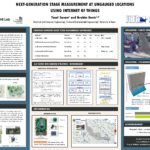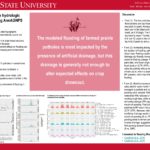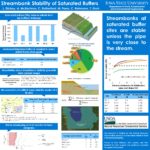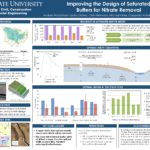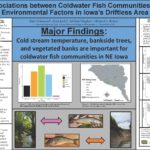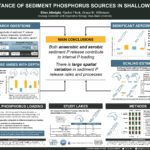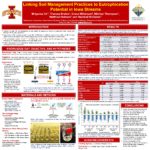With rising commodity prices and increasing recognition of land as a stable investment, agricultural land values have experienced unprecedented increases as evidenced by Iowa recently documenting a $20,000 per acre agricultural land sale. Rising land values and high commodity prices have many implications ranging from limiting opportunities for beginning farmers to devaluing the implementation of conservation practices; potential income losses associated with either real or perceived reduced commodity production drive the conservation practice devaluation. In selected situations, conversations suggest practices are removed simply for operator convenience. From a myopic economic perspective conservation is a cost to the producer or land owner and not an investment in the property.
Continue readingThe #IowaWater2020 Welcome Speech That Will Never Be Given
Post written by Melissa Miller, Associate Director for the Iowa Water Center
Today, at 10 a.m., I was supposed to greet 500+ of my closest friends and colleagues and say (with gusto), “Welcome to the 2020 Iowa Water Conference!”
If you’ve been our conference (or any conference, really), you know how that speech goes.
I would have thanked the planning committee for their tireless efforts in shaping the very best conference agenda for this year, a program that resonated with the theme “Bringing our water vision into focus.”
I would have thanked the sponsors and exhibitors for their generous support year after year.
I would have thanked you for coming and urged you to attend sessions outside of your comfort zone.
I would have introduced you to our amazing new conference logo and told you everything it stands for.
But, instead, at 10 a.m. on Wednesday, April 8, 2020, I’m making a mid-morning snack for my elementary-aged daughters before we go on a walk to the “creek” (okay, it’s a drainage ditch). I haven’t been to Ames in almost a month, and I don’t know when I’ll go again.
———————————–
When we announced the cancellation, we had many people reach out to us and express their condolences for the months of lost work and preparation. This missed opportunity to connect and grow side by side is suddenly a common tragedy of this strange new era. We lament with those who planned to present, with the students who planned to compete in the poster contest, for the morning sticky buns we won’t get to eat (I know at least a couple of you were already lamenting the loss of “Scheman Lasagna” from years past, for some reason).
But remember: the Iowa Water Conference is just two days. The work that went into it is not lost. We still had a diverse mix of organizations collaborating to conduct peer reviews of the latest water work in Iowa. We still had hours of introspection and discussion to identify the most pressing topics in water resource management in Iowa. We still built new relationships and cultivated old ones with Iowa’s hardworking water professionals and scientists. Building the Iowa Water Conference takes the entire year – for all of us. The two days is just the celebration.
—————————
In my welcome speech, there is one more thing I would have done this year. I would have challenged every single one of you to consider two questions as you listened to each presentation:
Who cares?
So what?
(Shout out to Molly Hanson, co-founder of Women for Water and conservation and community outreach specialist for RDG Planning & Design. Molly came up with this idea after we discussed my theory on cultivating and stewarding a community of “Water People.”)
This challenge still applies to the work you do, day in and day out. Ask yourself, who cares, and so what? Answering those questions both affirms the importance of the role you play and brings you closer to understanding how to reach the communities in which you’re working.
My final comment of the Welcome Speech That Will Never Be Given: we can and should still work to build a shared vision for Iowa’s water future. What do YOU want for Iowa’s future? Compare your answers with others’ answers. Where are we the same? Where and why are we different? What are our overarching goals that benefit the most people in an equitable and just way? What can you do in your work to move us toward those goals? And, perhaps most importantly, what will it look like when we get there?
Have an answer to any of these questions? Join in the conversation on Twitter with the hashtag #IowaWater2020. Jump in with real-time dialogue in our Water Scholars Book Club on Facebook. Send us an email.
Talk to you soon.

Melissa Miller is the associate director of the Iowa Water Center. She holds a BS in Kinesiology with an emphasis in Community and Public Health and MS degree in Community Development with an emphasis in Natural Resource Management, both from Iowa State University.
2020 Iowa Water Conference Posters
To see posters in greater detail, visit our flickr page.
Meet Meghan Hanley
My name is Meghan Hanley and I am very excited to be one of the new Outreach and Engagement Assistants for the Iowa Water Center.
Continue readingMeet Kelyin Chng
My name is Kelyin Chng and I will be fulfilling one of two Outreach and Engagement Assistant positions! I am currently majoring in Marketing while searching for a second major at Iowa State University. My experience within the field of Marketing has been exciting and I can’t wait to create engaging artifacts for the Iowa Water Center! I have explored the sales and design part of marketing but found more of a passion for the design side. Despite the curveball life has thrown at us, I am eager to begin this position online at home for the time being.
Continue readingA Message from the Iowa Water Center
There’s not much we can say to fully capture the whirlwind of the last few weeks and what’s to come as we prepare and respond to the COVID-19 pandemic. The Iowa Water Center staff is fortunate in that we can work remotely, continuing to advance water science to meet Iowa’s water resource needs. We applaud those who are doing their part to practice social distancing and are eternally grateful to those providing essential services outside the comfort and safety of their homes.
We will greatly miss hosting the Iowa Water Conference this year. We know that the conference is more than just a professional development opportunity – seeing each other face-to-face, provoking critical thought, and engaging in productive dialogue with our colleagues is an invaluable activity that is difficult to replicate virtually. At the One Water Summit in Austin, TX this past September, Pisces Foundation President David Beckman said something that resonated with us: “Relationships ARE infrastructure!” This statement is the crux of the work that we do.
To that end, we encourage you to stay connected with each other, and with us, over the coming weeks and months. We planned to use the conference hashtag #IowaWater2020 on Twitter and Facebook for the rest of the year in an effort to keep the conversation going. Now, we’ll use it as we introduce you to water scientists and practitioners, produce and promote virtual learning opportunities, and engage you in the water conversation all year long. We hope you will use it, too.
Our focus will remain on building a robust and connected water science community. We look forward to adapting and innovating during these challenging times.
Ask a Scientist – What is Groundwater
We ask Keith Schilling, State Geologist and Research Scientist at the Iowa Geological Survey, the question: What is groundwater?
Continue readingBuilding Youth Leadership Capacity Through Project-Based Learning
“ The world needs people who can lead others to make a change for the better if anything is gonna change for the better.”
This is a reflection from a Davenport North High School junior, one of the first students to experience environmental science education through a pilot program called “The Watershed Project,” sponsored by the Leopold Center for Sustainable Agriculture and administered by the Iowa Water Center (IWC).
Continue readingAsk a Scientist – Groundwater
We ask Keith Schilling, State Geologist and Research Scientist at the Iowa Geological Survey, the question: Why is groundwater important?
Continue readingAsk a Scientist – Biochar
We ask Marshall McDaniel, Assistant Professor in Agronomy at Iowa State University, the question: What is biochar?
Continue reading
